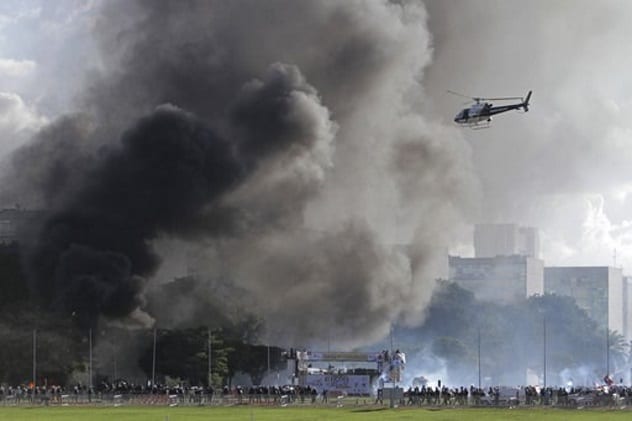10 Manchester Suffered Its Worst Terrorist Attack Ever
On Monday evening, an Islamist extremist walked into Manchester Arena just as an Ariana Grande concert was ending. In the crowded foyer, he detonated a suicide bomb filled with nails and scrap metal. Twenty-two lives were ended in a blink.[1] Sixty-four were badly injured. The worst part? Grande is an artist who sells to tweens. The bomber—who we refuse to dignify by naming—deliberately targeted and killed innocent children. The bombing came barely two months after an ISIS-inspired attacker rammed a car into pedestrians in London, killing four outside Westminster Parliament. It marks the worst attack in the UK since the 7/7 tube bombings and the worst to ever hit Manchester. Perhaps most chillingly of all, it suggests that the Islamist terrorism threat to the UK is increasing, as returning ISIS fighters begin to set up new terrorist networks. Although most of the world reacted with horror to this unspeakable atrocity, others sadly decided to ditch their humanity. Empathy-void Alex Jones sneeringly denigrated the dead children as “liberal trendies” and referred to them as “The same people, god love ’em, on average who are promoting open borders, bringing Islamists in,” while self-proclaimed Journalist with CBS and Examiner credits, David Leavitt, got torn to shreds on Twitter after posting the following comment shortly after the attack: “The last time I listened to Ariana Grande I almost died too.”
9 US Intelligence Services Shamefully Compromised The Manchester Investigation
Nearly as shocking as the bombing itself was the response of the US intelligence community. While the UK government was declining to name the bomber, US officials leaked it to the media. When Manchester police sent Washington detailed photos of the bomb used, American spooks immediately handed the files to The New York Times. If you’re not disgusted by this, you should be. Manchester police shared those pictures because US intelligence could use them to identify the specific bomb-maker. That would allow UK police to launch surprise raids that, hopefully, would stop a follow-up attack from taking place. By leaking to the media, US intelligence agencies deliberately undermined an active investigation, putting British lives at risk. Manchester police took the highly unusual step of refusing to share further intelligence with the US and have only restored intelligence-sharing today after receiving reassurances that it won’t happen again.[2] Intelligence is built on trust. Lifesaving facts are shared on the basis that they will not be leaked. Breaches like these decrease the chance of future intelligence sharing, increasing the chances of a deadly attack on UK or US soil. In this instance, the very people meant to protect us have sadly done the terrorists’ work for them.
8 Taiwan’s Top Court Ruled In Favor Of Same-Sex Marriage
As tragedy unfolded in Britain, over in Asia, something much more positive was happening. On Wednesday, Taiwan’s highest court ruled that laws preventing members of the same sex from marrying were unconstitutional. The judgement paves the way for Taiwan to become the first country in Asia to legalize same-sex marriage. This would be momentous. While many parts of East Asia don’t outlaw gay relationships, things pretty much stop there. Civil partnerships and the legal rights associated with them are almost unheard-of, let alone something like marriage. Taiwan’s high court has shaken all of that up. Not only did it rule that the current laws were unconstitutional, but it gave the government two years to change them (i.e. by introducing civil partnerships), or gay marriage would become de facto legal.[3] That’s not to say the story is over. Despite its liberal reputation, Taiwan has a powerful traditionalist lobby, and a backlash could yet derail the government’s plans.
7 Google’s AI Beat The World Go Champion
Remember all the fuss in 1997 when IBM’s Deep Blue beat world chess champion Garry Kasparov? Well, prepare to experience that all over again. This week, Google’s AI AlphaGo took on the reigning world champion at Go. It beat him so hard it left him eating its dust.[4] Go is to chess what chess is to Clue. It’s the most complex strategy game mankind has ever created, involving a 19 x 19 grid upon which you place colored stones to take over territory. It involves intuition, craft, gut feeling, and intellect, generally things thought to be beyond modern AI. Nineteen-year-old Ke Jie was the greatest player alive today. And AlphaGo handily wiped the floor with him. To be fair, AI has won at Go before. In 2016, high-profile player Lee Sedol lost four out of five matches to AlphaGo. But Ke Jie wasn’t just “high-profile.” He was a Go master—the Garry Kasparov of the game. Although real-world applications for AlphaGo are still a long way away, this week proved that artificial intelligence may well be advancing even quicker than we think.
6 The World Health Organization Elected Its First African Leader
Created in 1948 by the UN, the World Health Organization (WHO) has been at the forefront of global medicine for decades. In that time, it has had eight directors-general, from Europe, Asia, and North and South America. Yet, despite doing a ton of its work there, the WHO had never been chaired by anyone from Africa. This week, that all changed. Following an insanely close vote between 180 member nations, the WHO picked Dr. Tedros Adhanom Ghebreyesus from Ethiopia as its next head.[5] He takes over on June 30, when Dr. Margaret Chan steps down after a decade in the role. Dr. Tedros (who goes by his first name) was the architect of Ethiopia’s universal health care initiative, which saw some 3,000 new health centers opened across the impoverished nation. His appointment comes at a time when the WHO is badly in need of more credibility in Africa. The organization utterly bungled its response to Ebola and has been criticized as wildly ineffective in stopping Zika. Whether Dr. Tedros’s appointment can turn the tide remains to be seen.
5 China Revealed It Assassinated 12 CIA Operatives
In a week where US intelligence had already badly discredited itself, yet another story blew up showing that American espionage abilities seemed to be on the wane. On Saturday, The New York Times reported that China had smashed a CIA spy ring between 2010 and 2013, imprisoning at least eight operatives and murdering 12 more. But the real kicker came when China got wind of the story. Instead of denying it, Beijing boasted about it.[6] The Global Times is run by the People’s Daily, which is, in turn, run by the Chinese Communist Party. Something appearing in the paper generally means that Xi Jinping approves of it, and when that “something” is a brag about killing US assets, you’d better believe it has been approved at the highest levels. At the time the spy ring was smashed, it went dark so quickly that the CIA apparently had no idea what was going on. China’s Ministry of State Security left them scrabbling in the dark. It seems like the days of a feared CIA pulling off impossible operations may be over.
4 Brazilian Protestors Tried To Burn Their Government Down
Recall how, last week, we told you that the Brazilian president, Michel Temer, had been secretly recorded discussing how to bribe witnesses? It turns out the story was even more explosive in Brazil than anyone was anticipating. On Wednesday night, protestors went on the rampage in the capital, Brasilia. Things culminated when they nearly burned down an entire government ministry.[7] The torching of the Ministry of Agriculture caused the Brazilian congress to be evacuated and politicians flown to safety. President Temer dispatched troops onto the streets of the capital. But it wasn’t enough to stop growing discontent. By Thursday, Brasilia was suffering the most violent clashes it had seen in years. It now seems likely that Brazil will lose its second president in less than a year. Even that may not be enough to quell public anger. Since the massive corruption scandal that sank Temer’s predecessor broke, most of the Brazilian elite have been ensnared in its clutches. The original whistle-blower allegedly told investigators back in 2013 that, if he spoke, “the republic (was) going to fall.” He may yet turn out to be right.
3 ISIS Gunmen Stormed A Philippine City
The morning after the Manchester bombing, ISIS sent out a message claiming responsibility. While their connection has not yet been proven (their statement got some important details wrong), it might signal that the group is having its busiest week in a long time. As the carnage unfolded in Britain, ISIS-linked gunmen were swarming the streets of Marawi, a city of 200,000 in the Philippines. By the time anyone realized what was happening, 21 people were dead, the city’s police chief had been gruesomely executed, and the black flag of ISIS was flying over the wounded city.[8] Although the Philippines has long had a problem with Islamist rebels, this attack was breathtaking in its audacity. About 100 jihadists stormed the streets, set up their own roadblocks, kidnapped priests, and generally terrorized the citizens. After a battle to restore order, President Duterte placed the region under martial law, vowing to kill any suspected militants. Given that Duterte’s “war on drugs” has already killed 9,000 in a single year, there are worries his war on terror will now result in many innocent people being slaughtered alongside the militants.
2 A Controversial Study Claimed Humans May Have First Evolved In Europe
PLOS ONE is not a journal for cranks. This is important to keep in mind while reading about our next story. This week, a team of international scientists revealed a shocking new study in the journal. They suggested that humanity didn’t evolve in Africa, as generally accepted, but in Europe.[9] Their conclusions are highly controversial, to say the least. There’s a lot of fossil evidence supporting the “out of Africa” hypothesis that isn’t going away anytime soon. But the study still makes compelling claims. The authors analyzed fossilized teeth found in Greece and Bulgaria and showed that they had much in common with our early human ancestors. They dated them to 7.2–7.1 million years ago, exactly when chimps and protohumans diverged. Trouble is, it would have been almost impossible for an early human to get across the Sahara from Africa to Greece at this time, suggesting that our ancestors evolved in Europe first and later traveled back into Africa. This would completely rewrite the history of human life as we know it. It would also be yet another feather in Greece’s cap. Not only would the country have been home to the birth of Western civilization, it would have seen the rise of humans, too.
1 James Bond Died
After a 2016 that seemed intent on taking as many beloved celebrities from us as possible, 2017 has so far been fairly quiet on the significant deaths front (with the major exception of Chuck Berry). This week, we found out 2017 had merely been treading softly while it snuck up on one of the biggest celebrities of all. On Tuesday, Roger Moore’s family confirmed that the actor had passed away in Switzerland, aged 89. James Bond is dead.[10] Although he wasn’t the first, Moore was the Bond who lasted the longest. The veteran actor guided one of cinema’s biggest franchises through (appropriately) seven cinema outings, earning himself a permanent place in the hearts of kids and kids-at-heart across the world. He was suave. He was dapper. He was happy to play a scene for laughs. And for those of us who first saw his films as excitable eight-year-olds, he seemed like the coolest man alive. But Moore was more than just 007. An ambassador for UNICEF, he raised millions for children’s charities worldwide, frequently donating huge chunks of his Bond paychecks. He was, in short, a true English gent, one who made the world a better place. After such a dark, depressing week, it perhaps helps to reflect on the life of someone who spent his time on Earth trying his hardest to make children happy.
























